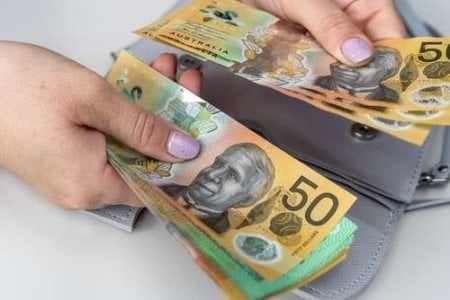Is cash back? Banks report huge increases in cash withdrawals within several months
By
Danielle F.
- Replies 38
In an age where digital transactions are becoming the norm, many people still rely on cold hard cash for their daily transactions.
However, the sudden spike in cash withdrawals among Australians raised eyebrows and sparked a conversation about the future of physical currency.
According to the Reserve Bank's recent data, there has been a noticeable increase in ATM withdrawals, with a 2.7 per cent jump between July and August this year.
Many people are speculating: is cash on the brink of obsolescence, or is it making a comeback?
The trend fuelled intrigue, considering the significant reduction in bank-owned ATMs across the country.
From nearly 14,000 in 2017 to just about 5,700 by mid-2023, ATMs have dwindled in numbers.
Yet, Australians are more eager to get their hands on cash.
This spike led cash campaigners to urge banks to meet consumer demand by improving access to physical money.
Jason Bryce, the founder of Cash Welcome, pointed out that around one million ATM withdrawals are made daily in the country.
Despite this, consumers continue to face surcharges to access their own money, while bank-owned ATMs continue to decline.
'Banks continue to close down our access to cash, but Australians are clearly looking for ATMs, travelling further to get cash and paying fees to access their money,' Mr Bryce stated.
The August spike in ATM withdrawals amounted to an additional 767,600 transactions nationwide.
While the number of withdrawals remained stable over the last three years, it's a far cry from the 70 million monthly withdrawals recorded in 2008.
Finance writer and editor Gemma Acton noted that only about seven per cent of transactions are done with cash.
'It's not a big amount, but for some people, cash is an essential source of payment,' Ms Acton shared.
'Senior Australians tend to use more cash. Regional and rural communities also tend to use more cash.'
During times of economic strain, people showed their preference towards cash, as it could give consumers a tangible sense of spending and saving.
Handing over notes and receiving change could make the impact of expenditure feel more authentic compared to tap-and-go transactions.
'There's also been a backlash on surcharging recently. You pay for a $4 coffee, and suddenly it's $4.17 instead. There are many reasons why cash is still very much alive and well, even if not used by a majority of people, Ms Acton added.
Recently, Westpac scrapped its cardless cash withdrawal feature across all ATMs.
Macquarie Bank recently went cashless, and Bankwest started transitioning into digital banking.
Some businesses, like Nandos and Gloria Jean's Coffee, even tried cashless transactions in their stores.
'We have heard calls for a cashless society for a very long time, often promoted by banks and card providers,' Ms Acton noted.
'We will probably head down that track, but I can't see cash being phased out completely any time soon.'

Have you been withdrawing more cash lately? What do you think of a future with no tangible banknotes? Share your opinions with us in the comments below, and let's navigate the future of money together.
However, the sudden spike in cash withdrawals among Australians raised eyebrows and sparked a conversation about the future of physical currency.
According to the Reserve Bank's recent data, there has been a noticeable increase in ATM withdrawals, with a 2.7 per cent jump between July and August this year.
Many people are speculating: is cash on the brink of obsolescence, or is it making a comeback?
The trend fuelled intrigue, considering the significant reduction in bank-owned ATMs across the country.
From nearly 14,000 in 2017 to just about 5,700 by mid-2023, ATMs have dwindled in numbers.
Yet, Australians are more eager to get their hands on cash.
This spike led cash campaigners to urge banks to meet consumer demand by improving access to physical money.
Jason Bryce, the founder of Cash Welcome, pointed out that around one million ATM withdrawals are made daily in the country.
Despite this, consumers continue to face surcharges to access their own money, while bank-owned ATMs continue to decline.
'Banks continue to close down our access to cash, but Australians are clearly looking for ATMs, travelling further to get cash and paying fees to access their money,' Mr Bryce stated.
The August spike in ATM withdrawals amounted to an additional 767,600 transactions nationwide.
While the number of withdrawals remained stable over the last three years, it's a far cry from the 70 million monthly withdrawals recorded in 2008.
Finance writer and editor Gemma Acton noted that only about seven per cent of transactions are done with cash.
'It's not a big amount, but for some people, cash is an essential source of payment,' Ms Acton shared.
'Senior Australians tend to use more cash. Regional and rural communities also tend to use more cash.'
During times of economic strain, people showed their preference towards cash, as it could give consumers a tangible sense of spending and saving.
Handing over notes and receiving change could make the impact of expenditure feel more authentic compared to tap-and-go transactions.
'There's also been a backlash on surcharging recently. You pay for a $4 coffee, and suddenly it's $4.17 instead. There are many reasons why cash is still very much alive and well, even if not used by a majority of people, Ms Acton added.
Despite the recent uptick in cash withdrawals, the future of cash remains uncertain.Recently, Westpac scrapped its cardless cash withdrawal feature across all ATMs.
Macquarie Bank recently went cashless, and Bankwest started transitioning into digital banking.
Some businesses, like Nandos and Gloria Jean's Coffee, even tried cashless transactions in their stores.
'We have heard calls for a cashless society for a very long time, often promoted by banks and card providers,' Ms Acton noted.
'We will probably head down that track, but I can't see cash being phased out completely any time soon.'
Key Takeaways
- The number of ATM withdrawals in Australia has increased, suggesting a potential comeback of physical currency.
- ATM numbers have been declining, which led to concerns over accessibility to cash and higher surcharge fees.
- Cash usage has been valued for its privacy, reliability, and budgeting advantages, contrasting with digital payments.
- Despite a significant drop in cash usage over recent years, it is unlikely that Australia will soon become a completely cashless society.








